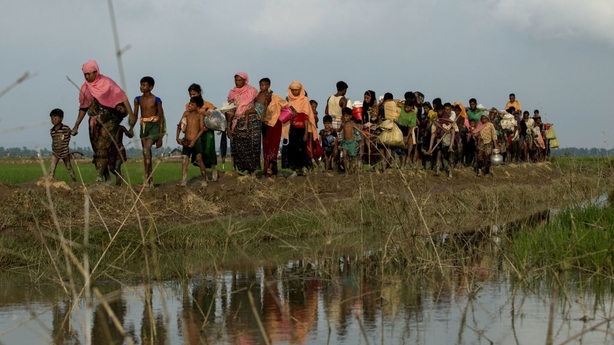The United Nations human rights chief has described the treatment of the Muslim Rohingya community in Myanmar as a "textbook example of ethnic cleansing."
Nearly 300,000 Rohingya have fled to Bangladesh and 30,000 non-Muslim civilians have been displaced inside Myanmar after the military launched a counter-offensive following attacks by the Arakan Rohingya Salvation Army insurgents on 30 police posts and an army base on 25 August.
Addressing the UN Human Rights Council in Geneva, Zeid Ra'ad al-Hussein denounced Myanmar's "brutal security operation," which he said was "clearly disproportionate" to the insurgent attacks.
He said more than 270,000 people had fled to Bangladesh, with more trapped on the border, amid reports of the burning of villages and extrajudicial killings.

"We have received multiple reports and satellite imagery of security forces and local militia burning Rohingya villages, and consistent accounts of extra judicial killings, including shooting fleeing civilians," Mr Zeid told the Geneva forum.
He cited reports that Myanmar authorities had begun to lay landmines along the border with Bangladesh and would require returnees to provide "proof of citizenship".
Rohingya have been stripped of civil and political rights including citizenship rights for decades, he added.
"I call on the government to end its current cruel military operation, with accountability for all violations that have occurred, and to reverse the pattern of severe and widespread discrimination against the Rohingya population," Mr Zeid said.
"The situation seems a textbook example of ethnic cleansing."
We need your consent to load this rte-player contentWe use rte-player to manage extra content that can set cookies on your device and collect data about your activity. Please review their details and accept them to load the content.Manage Preferences
Special report: Crisis in Myanmar
Last year Mr Zeid's office issued a report, based on interviews with Rohingya who fled to Bangladesh after a previous military assault, which he said on today had "suggested a widespread or systematic attack against the community, possibly amounting to crimes against humanity".
"I deplore current measures in India to deport Rohingyas at a time of such violence against them in their country," he said, noting that some 40,000 Rohingyas had settled in India, including 16,000 who have received refugee documentation.
Noting India's obligations under international law, he said:"India cannot carry out collective expulsions, or return people to a place where they risk torture or other serious violations."

